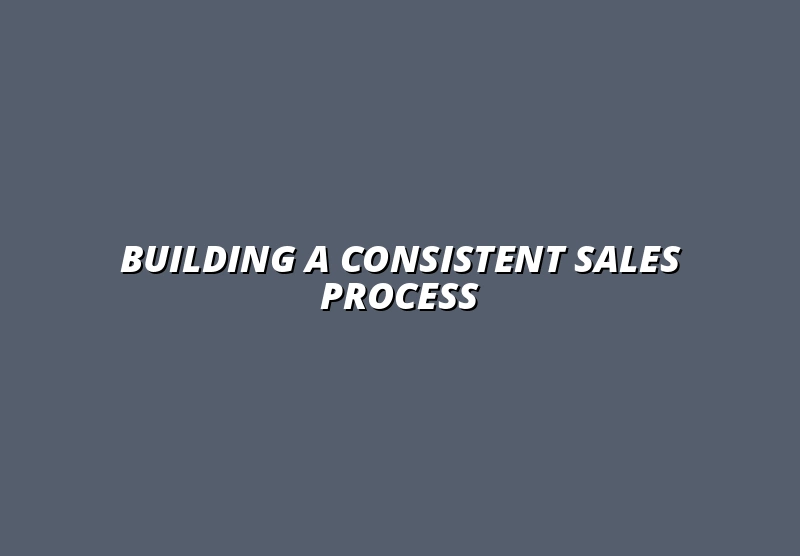Building a Consistent Sales Process

In an era where technology and sales converge, understanding how to leverage AI can be the determining factor for your business's success. As businesses face mounting pressures to adapt, it's essential to recognize the crucial elements that enhance sales processes.
What You Will Learn
- The significance of having a consistent sales process to optimize revenue.
- Common bottlenecks in traditional sales processes and how AI can help overcome them.
- Key components that contribute to a successful sales workflow, including lead generation and nurturing.
- How AI enhances sales consistency by automating tasks and providing real-time insights.
- The importance of defining Key Performance Indicators (KPIs) to measure the impact of AI on sales outcomes.
- Future trends in sales driven by AI, including predictive analytics and personalized customer engagement.
Sales Process Optimization with AI
This visual highlights key components, challenges, and AI's role in a successful sales workflow, along with crucial KPIs for measuring impact.
Sales Process Flow
Challenges in Traditional Sales
- ● Poor team communication
- ● Manual data entry errors
- ● Inconsistent follow-ups
- ● Difficulty in performance analysis
AI's Impact on Sales
- ● Automated lead scoring
- ● Enhanced data analysis
- ● Personalized interactions
- ● Improved team collaboration
Key Performance Indicators (KPIs)
- ● Sales Growth Rate
- ● Lead Conversion Rate
- ● Customer Acquisition Cost (CAC)
- ● Customer Lifetime Value (CLV)
Understanding the Importance of a Consistent Sales Process with AI
In today's competitive business landscape, having a consistent sales process is crucial for success. Many small to medium-sized businesses, like those we support at My AI Business Coach, face unique challenges that can hinder effective sales. Understanding these challenges is the first step toward improving your sales performance through the power of artificial intelligence (AI).
One common issue I’ve observed is the inconsistency in sales practices across different employees and teams. This can lead to missed opportunities and inefficiencies that ultimately impact revenue. By leveraging AI, we can streamline these processes, ensuring that every lead is nurtured effectively.
Challenges in Traditional Sales Processes
Traditional sales processes are often riddled with bottlenecks and inefficiencies. For instance, many businesses struggle with tracking leads and managing follow-ups, which can result in lost sales. Harvard Business Review emphasizes the importance of moving beyond the traditional sales funnel to better understand customer journeys, suggesting that a more nuanced approach is needed to assess performance accurately.
Here are some typical bottlenecks faced by businesses:
- Poor communication between sales teams
- Manual data entry leading to errors
- Inconsistent follow-up with leads
- Difficulty in monitoring and analyzing sales performance
Recognizing these challenges is vital as we seek solutions that can enhance sales efficacy.
Identifying Common Bottlenecks and Inefficiencies
Among the various inefficiencies, poor communication often stands out. When sales teams don’t have clear visibility into each other’s activities, it can lead to duplicated efforts or, worse, missed leads. Additionally, manual processes slow down the workflow, creating frustration among staff members.

By assessing these common issues, we can pinpoint areas for improvement. The good news is that many of these challenges can be addressed with the right tools and strategies.
The Role of AI in Overcoming Sales Challenges
AI plays a transformative role in addressing these bottlenecks. Through advanced analytics and automation, AI can help businesses streamline their sales processes effectively. Imagine having a system that automatically qualifies leads based on their behavior—this not only saves time but also enables teams to focus on high-value prospects.
Some key benefits of integrating AI into your sales process include:
- Automated lead scoring to prioritize engagements
- Enhanced data analysis for better forecasting
- Personalized customer interactions based on insights
- Improved collaboration among sales teams through centralized data
Defining a Consistent Sales Process
A consistent sales process is a structured approach that guides potential customers through their journey—from awareness to purchase. At My AI Business Coach, I emphasize the importance of defining this process to maximize efficiency and revenue. As noted by Yesware, a well-defined sales process is critical for achieving predictable and scalable sales results.
By standardizing sales practices, businesses can ensure that every team member follows a clear set of steps, resulting in a smoother experience for customers and employees alike.
Key Components of a Successful Sales Workflow
When designing your sales workflow, consider these crucial components:
- Lead Generation: Identifying potential customers
- Qualification: Assessing leads to determine their potential
- Nurturing: Engaging prospects through personalized interactions
- Closing: Finalizing sales and ensuring customer satisfaction
These components work together to create a seamless experience that not only boosts conversion rates but also fosters strong customer relationships.
How AI Enhances Sales Consistency and Efficiency
AI enhances the consistency of sales processes by automating repetitive tasks and providing real-time insights. For example, automated reminders for follow-ups can ensure no lead is forgotten, while AI-driven insights can help tailor pitches to match customer needs.
This level of support allows sales teams to work more efficiently and effectively, which ultimately leads to higher conversion rates. Implementing these AI technologies can transform how you approach your sales strategy.
The Impact of AI Algorithms on Sales Process Optimization
AI algorithms can analyze vast amounts of data to identify trends and patterns that may not be visible to the human eye. This analytical power enables businesses to optimize their sales processes continually. By leveraging AI, you can make data-driven decisions that enhance your sales strategy.
Consider how these algorithms can help with:
- Predicting which leads are most likely to convert
- Identifying upsell and cross-sell opportunities
- Improving customer segmentation for targeted marketing
With these insights, businesses can refine their sales processes and achieve greater success in an increasingly competitive market.
Pro Tip
To truly maximize the benefits of AI in your sales process, focus on integrating AI tools that offer predictive analytics. These tools can help you anticipate customer needs and tailor your sales approach accordingly, leading to higher conversion rates and increased customer satisfaction.
Evaluating the Impact of AI on Your Sales Process
As we dive into evaluating the impact of AI on your sales process, it's important to focus on measurable outcomes. After implementing AI tools, I often encourage clients to track specific Key Performance Indicators (KPIs) to gauge success. This approach allows businesses to understand not just whether AI is effective, but also how it can be continuously improved to drive sales.
Establishing a set of KPIs tailored to your business needs is crucial. These indicators provide a clear lens through which you can assess the impact of your AI tools on sales outcomes. Here are some KPIs we commonly recommend:
- Sales Growth Rate
- Lead Conversion Rate
- Customer Acquisition Cost (CAC)
- Customer Lifetime Value (CLV)
By monitoring these metrics, you can create a feedback loop that informs your strategy moving forward. This is not just about numbers; it's about transforming those insights into actionable steps.
Measuring Success: Key Performance Indicators to Monitor
Setting realistic expectations for results is vital when integrating AI into your sales process. Many businesses expect immediate returns, but success often takes time. I recommend defining your goals clearly—whether it’s improving lead conversion rates or reducing customer acquisition costs. This clarity helps in measuring success accurately.
Once you have your expectations set, the next step is to analyze data actively. This involves looking at trends over time rather than snapshots. Regularly reviewing your sales metrics not only helps evaluate AI effectiveness but also uncovers areas for improvement. Here’s how to get started:
- Review data weekly or monthly to identify trends.
- Compare metrics before and after AI implementation.
- Solicit feedback from your sales team about the AI tools in use.
These steps will provide a rounded view of how AI is influencing your sales process and where further adjustments may be needed.

The Future of Sales with AI: Trends and Predictions
Looking ahead, it's clear that AI will continue to reshape sales processes. Emerging technologies, such as machine learning and advanced analytics, are becoming essential in driving efficiencies. As I work with clients, I emphasize the importance of staying informed about these trends to remain competitive. Purdue University's insights into rethinking sales success highlight that focusing solely on closing deals is no longer sufficient; a broader view of customer value is essential.
One trend to watch is the rise of predictive analytics, which helps businesses forecast customer behavior based on historical data. This enables more personalized outreach and better-targeted marketing strategies. It's exciting to think about how these technologies can refine our approaches! Here are a few key trends shaping the future of sales:
- Increased reliance on AI for lead scoring and prioritization.
- Enhanced customer engagement through personalization.
- Greater automation of routine sales tasks.
By embracing these trends, you can prepare for the next generation of sales strategies and ensure your business stays ahead of the curve.
Preparing for the Next Generation of Sales Strategies
As we prepare for the future, integrating AI into sales means being ready for change. Digital transformation is not just a buzzword; it’s a pathway to evolving sales practices. The ability to adapt your strategies based on AI insights will set you apart from competitors.
At My AI Business Coach, we understand that aligning sales and marketing teams through these changes is vital. By leveraging AI tools effectively, businesses can ensure both teams are working towards common goals, ultimately driving greater success. Here are a few strategies to consider:
- Regular training sessions on new AI tools for all team members.
- Establishing clear communication between sales and marketing.
- Utilizing data insights to inform joint strategies.
These approaches will not only facilitate smoother transitions but also foster a culture of continuous improvement within your organization.
Recap of Key Points
Here is a quick recap of the important points discussed in the article:
- A consistent sales process is essential for maximizing efficiency and revenue.
- Identifying bottlenecks, such as poor communication and manual processes, is crucial for improvement.
- AI can streamline sales processes through automated lead scoring and enhanced data analysis.
- Key components of a successful sales workflow include lead generation, qualification, nurturing, and closing.
- Establishing measurable Key Performance Indicators (KPIs) helps evaluate the impact of AI on sales outcomes.
- Future sales strategies will increasingly rely on AI for predictive analytics and personalized customer engagement.
Frequently Asked Questions (FAQs)
Why is a consistent sales process important for business success?
A consistent sales process ensures that every potential customer is guided through a structured journey from awareness to purchase. This standardization maximizes efficiency, optimizes revenue, and provides a smoother experience for both customers and sales teams, leading to fewer missed opportunities and improved outcomes.
What are common bottlenecks in traditional sales processes that AI can address?
Traditional sales processes often suffer from poor team communication, manual data entry errors, inconsistent follow-ups with leads, and difficulty in analyzing performance. AI can overcome these by automating tasks like lead scoring, enhancing data analysis, personalizing interactions, and improving team collaboration through centralized data.
How does AI improve sales consistency and efficiency?
AI enhances sales consistency and efficiency by automating repetitive tasks, such as sending follow-up reminders, and providing real-time insights for tailored pitches. This allows sales teams to focus on high-value prospects, work more effectively, and achieve higher conversion rates.
What Key Performance Indicators (KPIs) should businesses monitor to measure the impact of AI on sales?
To evaluate the impact of AI on sales, businesses should monitor KPIs such as Sales Growth Rate, Lead Conversion Rate, Customer Acquisition Cost (CAC), and Customer Lifetime Value (CLV). Regularly tracking these metrics helps assess AI's effectiveness and identify areas for continuous improvement.
What are the future trends in sales driven by AI?
Future sales trends driven by AI include increased reliance on predictive analytics for forecasting customer behavior, enhanced customer engagement through hyper-personalization, and greater automation of routine sales tasks. These advancements will enable more targeted marketing and refined sales strategies.
Popular Posts
 Have you ever wondered how artificial intelligence can reshape consumer behavior and decision-making
Have you ever wondered how artificial intelligence can reshape consumer behavior and decision-making
 As the digital landscape evolves, small businesses are discovering that artificial intelligence is n
As the digital landscape evolves, small businesses are discovering that artificial intelligence is n
 Did you know that personalized marketing can lead to a revenue increase of up to 30%? In an era wher
Did you know that personalized marketing can lead to a revenue increase of up to 30%? In an era wher
 Are you aware that reactivating dormant customers can significantly enhance your business growth? Ma
Are you aware that reactivating dormant customers can significantly enhance your business growth? Ma
